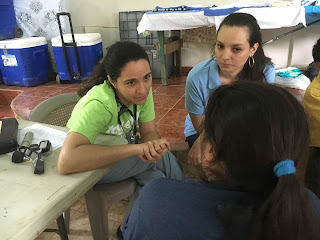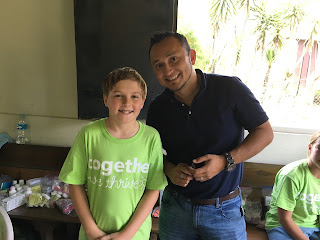Just a few weeks ago I had the privilege of travelling with
a team of medical students and physicians to a rural village in Honduras known
as Taulabe. The Kaiser Napa Solano
Family Medicine Residency Program has partnered with long standing local NGO –
ENLACE to help provide much needed care for villagers in this area. We
concentrated our work in the villages of El Diviso and Pal Michal Carmen .
I was immediately taken by the warm welcome we received by
our hosts. We were immediately fed after being picked up from the airport. I
found the Honduran food quite enticing and this was certainly one of the many
highlights of this trip. Our meals were prepared
fresh daily by two kind and amazing women, who one night took the time to teach
me how to make handmade tortillas. My favorite dishes included breadfruit and plantains,
not to mention fresh passion fruit juice.
(fried plantain and fried breadfruit)
(Left-My ugly handmade tortilla, Right- plantain canoe)
Another highlight was working with the medical students who
hailed from various medical schools within the United States and working with
local Honduran physicians. Our three medical students were quite experienced in
global health having spent time in the Peace Corps or doing global health
projects in Asia or Africa. They were enthusiastic bright and very hardworking.
I learned from them and I hope they were able to learn from me as well. The partnering of our team with local
physicians Dra. Floripe, Dra. Lillian
and Dr. Fabricio is what I believe to be one of the strengths of this trip. On
our first day we were given a presentation on the Honduran healthcare system
which set the tone for how we would practice while we were there. It was also
much easier to coordinate follow up care when working with local physicians.
(Global Health Sub- I's, Tyler Trang, Bethany Jackson, Alyson Davidson)
Last, but certainly not least the
reason for it all and the source of my passion for global health, the patients.
The patients I worked with throughout the week were some of the most kind and grateful
people I have ever met. Though the chief complaints were quite similar to my
patient population in the United States, headache, stomach pain, asthma etc the
defining difference was the lack of resources to manage some of these issues. For
instance, in the village of Pal Michael Carmen, many residents mainly women and
children suffer from chronic respiratory illness such as asthma and COPD due in
part to the use of wood burning stoves in the home. Over the past 7+ years
ENLACE has been working to replace these stoves with eco stoves designed by
ENLACE lead Israel Gonzales. However many of the homes in Pal Michal Carmen are
still in need of these new stoves. I congratulate ENLACE on all their efforts
in this regard and their approach to addressing healthcare upstream. Downstream
however there is still work to be done as the patients cannot afford inhalers
and there is no nebulizer in town. Thus many are treated orally and are not
under good control.
In spite of these challenges the
patients were optimistic and hopeful as well as grateful and I was happy and
humbled to have served them.
Francine Frater, MD












































